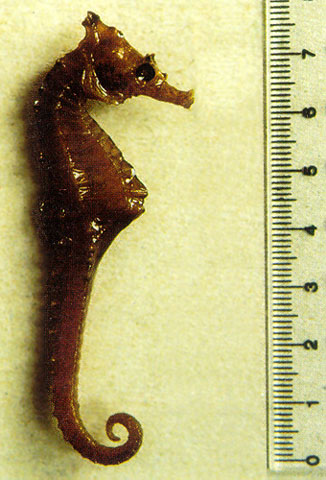| Syngnathidae (Pipefishes and seahorses), subfamily: Syngnathinae |
| 10 cm TL (male/unsexed) |
|
demersal; marine; depth range 0 - 60 m, non-migratory |
| Western Indian Ocean: Tanzania, Mozambique and South Africa. |
|
Dorsal spines (total): 0-0; Dorsal soft rays (total): 19-22; Anal spines: 0-0; Anal soft rays: 4-5. Description: (based on 3 specimens): Adult height: 6.5-10.0 cm. Rings: 11 + 38. Snout length: 2.7-2.9 in head length. Dorsal fin rays: 19-22 covering 2+1 rings. Pectoral fin rays: 17-18. Coronet: very high, inclined backwards, with a rounded top. Spines: low, or none. Other distinctive characters: low or prominent eye spine; short snout (less than half head length).
Color pattern: variable; dark spot on top of coronet; dark spots on the dorsolateral surface of the first, fourth and seventh trunk rings (not always visible). |
| Found in seagrass and algal beds (Ref. 52034). Ovoviviparous (Ref. 205). The male carries the eggs in a brood pouch which is found under the tail (Ref. 205). |
|
Data deficient (DD); Date assessed: 17 August 2016 Ref. (130435)
|
| harmless |
Source and more info: www.fishbase.org. For personal, classroom, and other internal use only. Not for publication.

